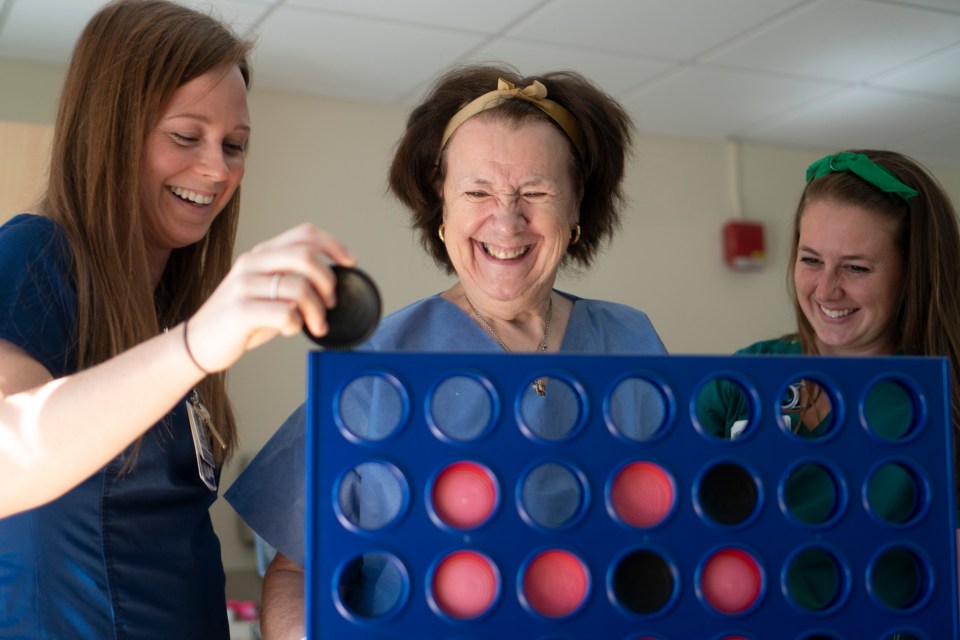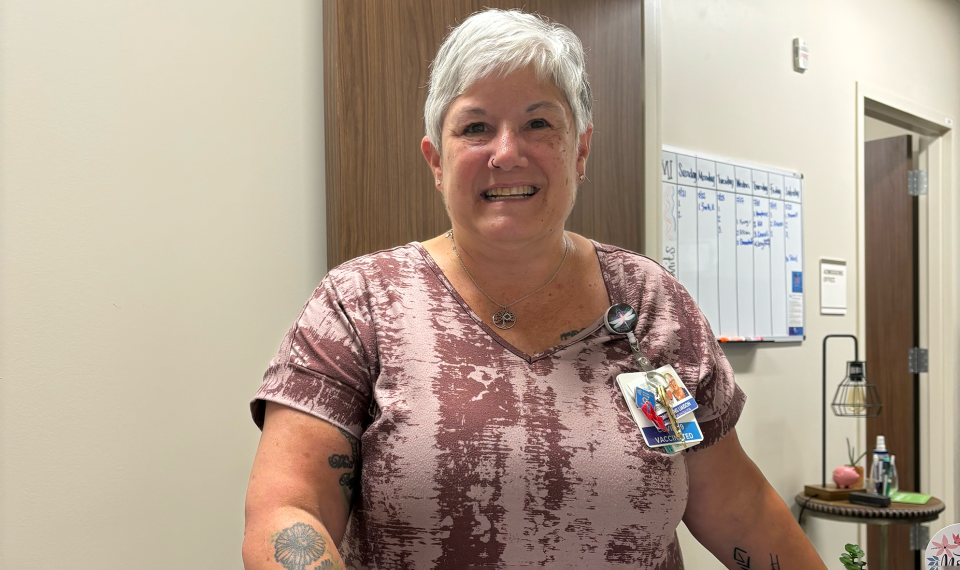Pizza, bingo and field trips don’t sound like typical components of a speech therapy session, but these activities are routine for Encompass Health’s speech language pathologists.
In a typical day, Katelyn Cammisa will treat eight to ten patients. As a speech language pathologist (SLP) at Encompass Health Rehabilitation Hospital of Braintree in Massachusetts, she’s tasked with conducting speech therapy sessions with patients who have survived stroke or traumatic brain injury or are living with an illness that weakens the muscles used for speech and swallowing, or causes cognitive or language impairment.
Speech therapy sessions take many forms, but the goal is the same: to strengthen those vital muscles and help patients become more independent. Whether in individual or group sessions, SLPs help patients improve function at meal time in addition to word finding, word production, memory skills and more.
“As an SLP, I work with patients on cognition, language, swallowing; it depends on what the patient is struggling with,” Cammisa said. “Whether they have aphasia, difficulty speaking loudly or speaking at all, we’re here to help.”
Putting the ‘Fun’ in Functional Therapy
Encompass Health staff aim to make therapy sessions enjoyable and focus on functional therapy. A simple game of bingo can exercise both the brain and throat as the players identify letters and numbers on a score card and shout when they’ve won. Games like Connect Four and Yahtzee are also in the SLP wheelhouse, and the therapists try to simulate real-world experiences when possible.
“Sometimes we’ll take our patients to a restaurant near the hospital,” Camissa said. “The patient will be tasked with following a map to navigate there, reading the menu, ordering their food, making change when paying for their food— it’s pretty awesome to see. These simple tasks can be very challenging.”
Sara Woodcome, a speech language pathologist at neighboring Encompass Health Rehabilitation Hospital of New England in Woburn, also believes in a unique approach to functional therapy.
“If someone is having problems swallowing, we can alter their diet and perform what we call food trials. There can be a lot of anxiety around choking, so we give the patient opportunities to practice eating and drinking in a safe environment,” Woodcome said.
“If their goal is to eat a piece of pizza, we have that here, and we’ll work towards getting that slice down.”
For each individual, a tailored care plan is created in order to educate the patient on exercises most pertinent to their areas of weakness, as well as vocal hygiene strategies. In order to preserve the voice, patients should stay hydrated, avoid straining their voice and never smoke.
SLPs are dedicated to making sure patients have the know-how to function after discharge. Of the functional skills that patients will need when they return home, medication management and money management often top the list. Forgetful patients who must take medication after discharge are encouraged to download mobile apps on their phone or tablet to help keep them on schedule.
“Outside of therapy, there are other ways we try to equip patients for success. If a patient has vision problems or a muscle issue that makes it hard to flip through a book, we encourage the use of audio books, and we’ll try to help them find free downloads and other resources,” Woodcome said.
The Inpatient Rehabilitation Setting is a World Apart
The responsibilities of a speech language pathologist can depend on the care setting. Cammisa explained that in the acute care setting, an SLP is likely to perform swallowing evaluations throughout the day and not expect much variation from that task. Because of the many conditions for which Encompass Health patients seek treatment, the nature of the work is more diverse.
“My days can be really varied. I may do a swallowing eval with one patient, then work with another patient who has Parkinson’s disease and wants to talk louder,” Cammisa said. “After that, I’ll work with someone who has memory problems. It’s always something different.”
When asked why she chose a career as a speech language pathologist in the inpatient rehabilitation setting, both Camissa and Woodcome agree that working in a collaborative environment that drives patient success is a big selling point.
“I’ve worked in many healthcare settings, including skilled nursing facilities. Inpatient rehabilitation is the best of all the worlds for me,” Woodcome said. “By the time they get here, the patients are ready to begin the healing process. When they are so motivated to get better, you become that much more invested in their success.”
Having a robust support system also makes a difference.
“I’m not an island,” Woodcome explained. “In the nursing home, I was the only speech therapist. Here we have a team of SLPs who can bounce ideas off each other. There isn’t a culture of, ‘Not my patient, not my problem.’ We’re all invested in each other’s work and the success of every patient.”
Cammisa agrees.
“I know every company likes to say they have a team approach to problem solving, but it’s true here,” she said. “Being on this therapy team means doing what you love, alongside other people doing what they love. It’s a unique experience. ”
Looking for SLP job opportunities?
To learn more about career opportunities for speech language pathologists at Encompass Health, we invite you to stay in touch with us by joining our talent community so a member of our recruitment team can email you with more information, or sign up to receive job alerts.
To pursue a career with Encompass Health, you can search for open opportunities near you.
The content of this site is for informational purposes only and should not be taken as professional medical advice. Always seek the advice of your physician or other qualified healthcare provider with any questions you may have regarding any medical conditions or treatments.



